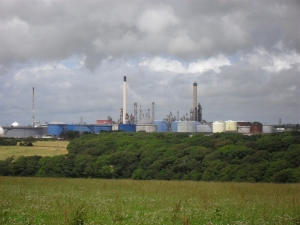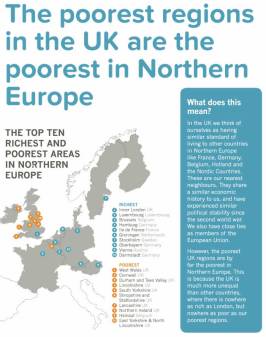 Milford’s future will take a sharp turn with the decommissioning of one of the only high paying industries on its side of the Cleddau. The town has a history that is a product of external influences due to its reliance on heavy industry. Oil came to Milford due to political crisis in Egypt making economic sense to refine it here. Industries have come and gone and so have the jobs that have come with them, with no shame in the depravity they have left behind.
Milford’s future will take a sharp turn with the decommissioning of one of the only high paying industries on its side of the Cleddau. The town has a history that is a product of external influences due to its reliance on heavy industry. Oil came to Milford due to political crisis in Egypt making economic sense to refine it here. Industries have come and gone and so have the jobs that have come with them, with no shame in the depravity they have left behind.
The decommissioning of the Murco refinery due to the collapse of the deal with Klesch not only deals a heavy blow to all those who will lose their jobs at the plant in the period before Christmas, but it also deals a hard blow to the population of Milford and throughout the wider county.
Some of the impact will be felt immediately, but it is the long term and unknown consequences of the closure that could have the most devastating consequences. Jobs will be lost throughout entirety of the refinery supply chain and by those who rely on the circulation of money being brought into the area by the petrochemical industry will also bear the brunt as the level of aggregate demand drops; with the refinery contributing around £30m a year to the local economy the BBC estimates that up to 4200 jobs could go.
The closure would be a tragedy nationally in any industry, but it comes directly to an area that already suffers from deep levels of deprivation and Milford is about to get a lot poorer as part of its black oily heart is ripped out from within. Not only is West Wales the poorest region in Britain but according to recent data by Eurostat, the poorest region in the whole of Northern Europe. Parts of Milford also rank lowly in the Welsh Index of Multiple Deprivation and have previously been placed in the top 20% most deprived regions in Wales. West Wales is so poor that it has received successive rounds of EU funding to address the problem. Why is the central government not more involved in putting West Wales and Pembrokeshire on more of a level footing with the rest of the UK?
Sure, Milford has been here before, not that this will make it any easier, with unemployment rates during the 80’s and the 90’s reaching as high as 30% as other refiners shut up shop and left. However, joblessness and unemployment leave scars. According to research, those who are unemployed in their youth are likely to receive subsequent lower pay, higher unemployment and reduced life chances. Some of these scars can be clearly demarcated in Milford, the problems have become inter-generational and where the jobs that have partially filled the void are low-skilled, low-wage service sector positions. This makes the loss of highly paid, high skill jobs at Murco seems even more pertinent.
The response of the government in all of this? David Cameron called failure of the Murco-Klesch deal “very disappointing“. Milford has been left to the wolves and the Westminster government couldn’t care and can hardly look beyond the border of the M25. One could only imagine the rhetoric and bravado we would have found him espousing over the need for such a deal to go through if the plant was located in Scotland months before the Scottish independence vote; and he certainly did as he played politics by granting the Grangemouth plant in Scotland a £230 million loan guarantee from the UK Government, a vain desperate attempt to buy Scottish votes before he accidentally oversaw the breakup of the union. This is a response from the government that everyone in Milford should find disappointing.
Stephen Crabb, an MP with one eye loosely fixed on his constituency and the other firmly on his Westminster career stated: “The problem wasn’t on the government side”. Come next May those who vote would do well to remind themselves what his party in government has achieved in this parliament having overseen a savage level of cuts in both services and access to them. What works in the South East of England doesn’t necessarily mean it works well in West Wales. That’s up to 4200 jobless people entering a harsh environment where the social net has been slashed beneath them and Crab is party to that. Cuts caused by a systemic crisis in banking we’re about as collectively responsible for about as much as the government is for the failure of the deal with Klesch.
Young people, who are typically most affected by joblessness, enter a world where the rhetoric of the nasty party has labeled them as scroungers and strivers. You can strive as much as you want, but when there is lack of quality employment and a lack of access to courses and funding because of cuts, there is only so much ‘striving’ you can do. Life is much more difficult when you find the social ladder has been pulled high enough that you can’t even reach the first rung.
The Welsh Assembly it seems has been left to pick up the pieces. What has been offered to save one of the vital lifelines in the West Wales economy? Very little so far. The minuscule financial might of the slightly devolved assembly is left to soften this economic bludgeon. Whilst their response can be seen as reasonably amenable, their lack of real power is a problem when dealing with the problems the region faces. It is also somewhat ironic that a call has been made to the government for access to European funds at a time when the main Westminster parties continue to fight over our position in Europe and if we belong within the European Union.
What Milford Haven needs is support from a strong devolved power that is answerable to the people that live there and have a direct interest in what goes on. There is no reason why we should not find ourselves with at least some of the same powers the people in Scotland have won. All we have now is successive bouts of isolation where the lives of thousands are continually and deeply affected, a situation where what happens to those in Milford and in the wider county is of no interests to the parties that quarrel amongst themselves in London. It is about time we sought change for ourselves, so that we are able to carve out a sustainable and sound future for Milford, Pembrokeshire and Wales as a whole.
